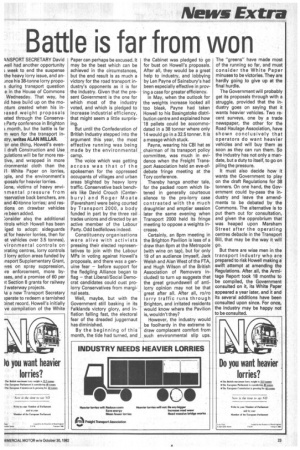Battle is far from won
Page 17

If you've noticed an error in this article please click here to report it so we can fix it.
4NSPORT SECRETARY David Nell had another opportunity r week to end the suspense the heavy lorry issue, and anince his 38-tonne lorry propo s during transport question e in the House of Commons Wednesday. That way, he ild have build up on the montum created when his inrased weight proposals isted through the ConserveParty conference in Brighton month, but the battle is far m won for the transport indry, writes ALAN MILLAR.
or one thing, Howell's even
I draft Construction and Use )ulations will be far more restive, and wrapped in more fironmental cloth than the. 11 White Paper on lorries, )ple, and the environment's iposals for heavier lorries.
ione, victims of heavy envinmental pressure from nservative back benchers, are. and 40-tonne lorries; and restions on drawbar vehicles (e .been added.
:onsider also the additional drols which Howell has been iged to adopt: sideguards st for heavier lorries, then for st vehicles over 3.5 tonnes), vironmental controls on rating centres, lorry controls lorry action areas funded by insport Supplementary Grant, ivet on spray suppression, ire enforcement, more bymes, and a promise of 60 per it Section 8 grants for railway I waterway projects.
a new Transport Secretary sperate to redeem a tarnished ainet record, Howell's initially ye compilation of the White Paper can perhaps be excused. It may be the best which can be achieved in the circumstances, but the end result is as much a victory for the road transport industry's opponents as it is for the industry. Given that the present Government is the one for which most of the industry voted, and which is pledged to increase industrial efficiency, that might seem a little surprising.
But until the Confederation of British Industry stepped into the argument this year, the most effective running was being made by the environmental camp.
The voice which was getting across was that of the spokesmen for the oppressed occupants of villages and urban areas blighted by heavy lorry traffic. Conservative back benchers like David Crouch (Canterbury) and Roger Moate (Faversham) were being courted by Transport 2000, a body funded in part by the three rail trades unions and directed by an _ active member of the Labour Party. Odd bedfellows indeed.
Constituency organisations were alive with activists pressing their elected representatives to join with the Labour MPs in voting against Howell's proposals, and there was a genuine fear — before support for the fledgling Alliance began to flag — that Liberal/Social Democrat candidates could oust prolorry Conservatives from marginal seats.
Well, maybe, but with the Government still basking in its Falklands victory glory, and inflation falling fast, the electoral fear of the dreaded juggernaut has diminished.
By the beginning of this month, the tide had turned, and the Cabinet was pledged to go for bust on Howell's proposals. After all, they would be a great help to industry, and lobbying by Len Payne of Sainsbury's had • been especially effective in proving a case for greater efficiency.
In May, when the outlook for the weights increase looked all too bleak, Payne had taken Howell to his Basingstoke distribution centre and explained how 18 pallets could be accommodated in a 38 tonner where only 14 would go in a 32.5 tonner. It is a messge which stuck.
Payne, wearing his CBI hat as chairman of its transport policy committee, was much in evidence when the Freight Transport Association held an eve-ofdebate fringe meeting at the Tory conference.
Thereby hangs another tale, for the packed room which listened in generally courteous silence to the pro-lorry case contrasted with the much draughtier and emptier session later the same evening when Transport 2000 held its fringe meeting to oppose a weights increase.
Certainly, an 8pm meeting in the Brighton Pavilion is less of a • draw than 6pm at the Metropole (with wine on tap), but for only 19 of an audience (myself, Jack Welsh and Alan West of the FTA, and Hugh Wilson of the British Association of Removers included) to turn up suggests that the great groundswell of antilorry opinion may not be that great after all. After all, ro/ro lorry traffic runs through Brighton, and irritated residents would know where the Pavilion is, wouldn't they?
However, the industry would be foolhardy in the extreme to draw complacent comfort from such environmental slip ups. The "greens" have made most of the running so far, and must consider the White Paper minuses to be victories. They are hardly going to give up at the final hurdle.
The Government will probably get its proposals through with a struggle, provided that the industry goes on saying that it wants heavier vehicles. Two recent surveys, one by a trade newspaper, the other for the Road Haulage Association, have shown conclusively that operators do want heavier vehicles and will buy them as soon as they can run them. So the industry has not only a mandate, but a duty to itself, to go on piling the pressure.
It must also decide how it wants the Government to play on the draft Regulations for 38 tonners. On one hand, the Government could by-pass the industry and leave the amendments to be debated by the Commons. The alternative is to put them out for consultation, and given the opprobrium that was heaped upon Marsham Street after the operating centres debacle in the Transport Bill, that may be the way it will go.
But there are wise men in the transport industry who are prepared to risk Howell making a swift attempt at amending the Regulations. After, all, the Armitage Report took 18 months to be compiled, the Government consulted on it, its White paper appeared a year later, and it and its several additions have been consulted upon since. For once, the industry may be happy not to be consulted.






































































